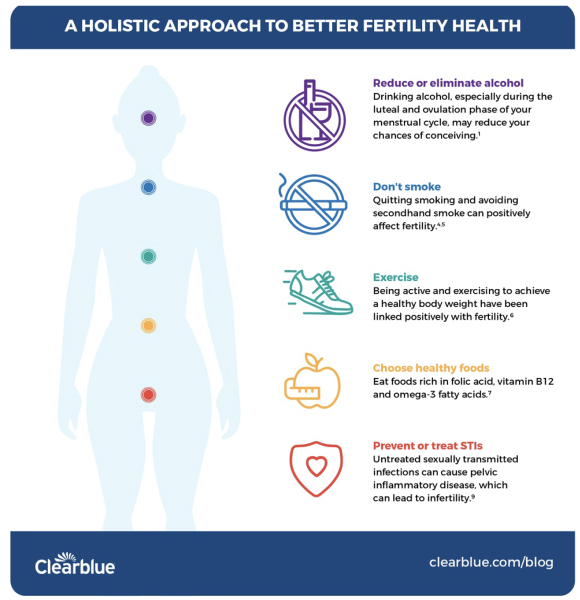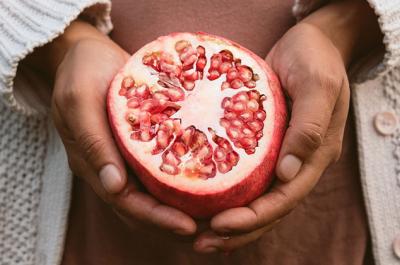How to boost fertility health: Steps that may help

This article is for general information only; it does not constitute medical advice, nor should it be construed as such.
First things first: What does “fertility health” mean, exactly? Simply put, “fertility” is the ability to get pregnant naturally. “Health” includes all the positive physical and mental steps you can take (and negative choices you can avoid) to promote fertility.
Understanding fertility is an important part of trying to get pregnant — and so many misconceptions exist that it can be hard to know what actually may help improve your overall fertility health. We’re here to clear up the confusion.
How to improve fertility: five tips that may help
Whether you and your partner are embarking on a pregnancy journey or have been trying to conceive (TTC) for a few months or more, these tips may help support overall fertility health.
1. Reduce or eliminate alcohol.
Drinking alcohol, especially during certain phases of your cycle, may reduce your chances of getting pregnant.1 A 2022 study published in Human Reproduction found that participants who drank six or more alcoholic beverages a week during the ovulatory phase of their menstrual cycle had reduced chances of conceiving. Drinking three to six alcoholic beverages during the luteal phase also negatively affected the chances of getting pregnant.1
If you’re already receiving fertility treatments, you might consider reducing the number of drinks you have each week.2 A research review published in October 2022 looked at the results of nine studies on alcohol consumption and how it affected more than 26,000 women and their partners. Based on these studies’ findings, the review suggested that women who drank 84 grams of alcohol (that’s about seven alcoholic beverages) a week while undergoing certain fertility treatments like IVF were about 7% less likely to get pregnant.2
According to The American College of Obstetricians and Gynecologists (ACOG), there is no safe amount of alcohol use during pregnancy.3
2. Don’t smoke.
The U.S. Food & Drug Administration (FDA) states plainly that “smoking can reduce fertility.”4 Other experts agree: In a committee opinion published in 2018, the Practice Committee of the American Society for Reproductive Medicine (ASRM) found strong evidence that smoking or exposure to secondhand smoke while TTC negatively affected the ability to get pregnant.5
Additionally, smoking while pregnant has been found to cause health issues for both mother and baby, and can increase the chances of early pregnancy loss.5 If you’re currently smoking, now is the time to quit.
3. Get some exercise.
Being active and exercising to achieve a healthy body weight has been linked positively with fertility.6 A study published in 2019 in PLoS One that looked at the physical activity and lifestyle of 302 men and women (about half of whom were experiencing infertility) concluded that, for women, a sedentary lifestyle, high body fat and low fat-free mass were risk factors for infertility.6
If you’re a habitual couch potato (no judgment here!), look for ways throughout your week to move your body, from taking a brisk walk around the block to swimming a few laps at the community pool. Finding an exercise or activity you enjoy can help you stick with it consistently.
4. Choose healthy foods.
What you eat can have an impact on fertility!7 A 2020 review of past studies conducted by researchers at Harvard T.H. Chan School of Public Health and Harvard Medical School found that eating a healthy diet high in folic acid, vitamin B12 and omega-3 fatty acids can have a positive effect on fertility.7
What foods should you add to the menu? An expert review published in the American Journal of Obstetrics & Gynecology connected eating a diet with lots of seafood, poultry, fruits and veggies, and whole grains (sometimes called the Mediterranean diet) with better fertility in women.8
While you’re loading up on whole grains and green leafy vegetables, try to cut down on foods “rich in red and processed meats, potatoes, sweets and sweetened beverages.” Per Harvard Health, diets high in these foods have been found to have a negative effect on fertility.7
5. Prevent or treat sexually transmitted infections (STIs).
Untreated STIs such as chlamydia and gonorrhea can cause pelvic inflammatory disease (PID) or tubal factor infertility (TFI), which can lead to infertility.9 If you have an STI or believe you’re experiencing symptoms of one, talk to a healthcare professional about screening, treatment options and next steps.

Fertility and ovulation: When are you most likely to get pregnant?
Beyond the lifestyle changes and choices you can make to support your fertility health, timing is a crucial factor when you’re TTC. You can only get pregnant in the days leading up to and day of ovulation itself, a time frame commonly referred to as your “fertility window.” Tracking your menstrual cycle and using our ovulation calculator to help determine when you might ovulate are two good ways to increase your chances of getting pregnant. The best way to track is by using an ovulation test kit.
Your time of peak fertility occurs the day before and the day of ovulation. Recognizing physical signs of ovulation and using ovulation tests to detect your key fertility hormones can help you better understand when to have sex if you’re TTC.
Debunking fertility myths: advice you should ignore
As you learn more about ovulation, fertility and conception, remember that for centuries the topic of fertility health has been awash with superstition. Maybe you’ve been told by a well-meaning aunt or friend that raising your legs after sex helps the sperm on their journey, drinking cough syrup will loosen up your cervical mucus, or that you need to have an orgasm to conceive. These are all myths.
Additionally, an entire industry of “fertility-boosting” products has seemingly popped up overnight, touting everything from herbal supplements to teas to lubricants that purportedly increase your chances of getting pregnant. Often, the research on these products’ efficacy is mixed or nonexistent.
How do you cut through the noise and separate fact from fiction? Talk to a healthcare professional. They can offer you personalized advice based on your lifestyle, age and goals.
How to boost male fertility
If your partner is male and you’re not using a sperm donor, keep in mind that his fertility health plays a part, too! Your ob-gyn may advise him to:
- Stop smoking10
- Reduce his alcohol intake10
- Practice safe sex if he is having sex with multiple partners10
- Lose weight if he currently has a high BMI10
- Avoid high heat around his testicles (such as a laptop or hot tubs)10
In the past you may have viewed getting pregnant as something that just happens automatically after having unprotected sex. Now you know many factors are at play! But whether you get pregnant on the first try or the tenth, supporting your fertility health can only be positive for both conception and the pregnancy ahead.
Related Articles
Sources
- Anwar MY, Marcus M, Taylor K. The association between alcohol intake and fecundability during menstrual cycle phases. Hum Reprod. 2021;36(9):2538-2548. doi: 10.1093/humrep/deab121. Accessed September 29, 2023. https://pubmed.ncbi.nlm.nih.gov/34102671/
- Rao W, Li Y, Li N, Yao Q, Li Y. The association between caffeine and alcohol consumption and IVF/ICSI outcomes: a systematic review and dose-response meta-analysis. Acta Obstet Gynecol Scand. 2022;101(12):1351-1363. doi: https://doi.org/10.1111/aogs.14464. Accessed September 29, 2023. https://obgyn.onlinelibrary.wiley.com/doi/10.1111/aogs.14464
- The American College of Obstetricians and Gynecologists. Alcohol and pregnancy. Updated February 2023. Accessed December 18, 2023. https://www.acog.org/womens-health/infographics/alcohol-and-pregnancy
- U.S. Food & Drug Administration. How smoking affects reproductive health. Updated November 9, 2021. Accessed September 29, 2023. https://www.fda.gov/tobacco-products/health-effects-tobacco-use/how-smoking-affects-reproductive-health
- Practice Committee of the American Society for Reproductive Medicine. Smoking and infertility: a committee opinion. Fertil Steril. 2018;110(4):611-618. doi: https://doi.org/10.1016/j.fertnstert.2018.06.016. Accessed September 29, 2023. https://www.fertstert.org/article/S0015-0282(18)30492-8/fulltext
- Foucaut A-M, Faure C, Julia C, Czernichow S, Levy R, Dupont C. Sedentary behavior, physical inactivity and body composition in relation to idiopathic infertility among men and women. PLoS One. 2019;14(4). doi: https://doi.org/10.1371/journal.pone.0210770. Accessed September 29, 2023. https://journals.plos.org/plosone/article?id=10.1371/journal.pone.0210770
- Shmerling RH, Shmerling A, Harvard Health Publishing. Fertility and diet: Is there a connection? Updated November 3, 2020. Accessed September 29, 2023. https://www.health.harvard.edu/blog/fertility-and-diet-is-there-a-connection-2018053113949
- Gaskins AJ, Chavarro JE. Diet and fertility: a review. Am J Obstet Gynecol. 2017;218(4):379-389. doi: https://doi.org/10.1016/j.ajog.2017.08.010. Accessed September 29, 2023. https://www.ajog.org/article/S0002-9378(17)30945-6/fulltext
- Tsevat DG, Wiesenfeld HC, Parks C, Peipert JF. Sexually transmitted diseases and infertility. Am J Obstet Gynecol. 2017;216(1):1-9. doi: https://doi.org/10.1016/j.ajog.2016.08.008. Accessed September 29, 2023. https://www.ajog.org/article/S0002-9378(16)30573-7/fulltext
- Mayo Clinic. Healthy sperm: Improving your fertility. Updated May 13, 2022. Accessed September 29, 2023. https://www.mayoclinic.org/healthy-lifestyle/getting-pregnant/in-depth/fertility/art-20047584




